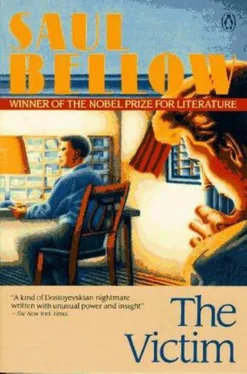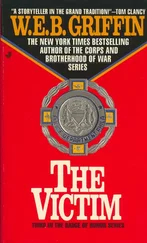Saul Bellow - The Victim
Здесь есть возможность читать онлайн «Saul Bellow - The Victim» весь текст электронной книги совершенно бесплатно (целиком полную версию без сокращений). В некоторых случаях можно слушать аудио, скачать через торрент в формате fb2 и присутствует краткое содержание. Год выпуска: 1988, Издательство: Penguin Books, Жанр: Современная проза, на английском языке. Описание произведения, (предисловие) а так же отзывы посетителей доступны на портале библиотеки ЛибКат.
- Название:The Victim
- Автор:
- Издательство:Penguin Books
- Жанр:
- Год:1988
- ISBN:нет данных
- Рейтинг книги:3 / 5. Голосов: 1
-
Избранное:Добавить в избранное
- Отзывы:
-
Ваша оценка:
- 60
- 1
- 2
- 3
- 4
- 5
The Victim: краткое содержание, описание и аннотация
Предлагаем к чтению аннотацию, описание, краткое содержание или предисловие (зависит от того, что написал сам автор книги «The Victim»). Если вы не нашли необходимую информацию о книге — напишите в комментариях, мы постараемся отыскать её.
The Victim — читать онлайн бесплатно полную книгу (весь текст) целиком
Ниже представлен текст книги, разбитый по страницам. Система сохранения места последней прочитанной страницы, позволяет с удобством читать онлайн бесплатно книгу «The Victim», без необходимости каждый раз заново искать на чём Вы остановились. Поставьте закладку, и сможете в любой момент перейти на страницу, на которой закончили чтение.
Интервал:
Закладка:
It was fortunate that Philip was talkative, for, if he had been shy, Leventhal would have thought he was being reproached for his past neglect, not to be made up for in a single afternoon. He had read such a reproach into his silence last week, when he gave him the quarter. But there was no cause for misgiving. Philip talked on fluently, and Leventhal, though his mind sometimes appeared to be elsewhere, was secretly minutely attentive. The emotions Philip raised in him deepened his ordinary stolidity. But he glanced frequently at the slope of his cropped, handsome long head and into his face, and he thought that Elena’s blood might show in his features but not in his nature. There they had something in common. The boy seemed to see it, too, Leventhal told himself.
Philip put his hand on a chocolate slot machine on one of the pillars, and Leventhal hastily went through his pockets for pennies and put in five or six, turning the knobs. The train rolled in while he was getting the chocolate out of the metal trough, and they abandoned the machine and ran.
“What do you say we walk a little?” Leventhal suggested at Pennsylvania Station. They got out and started up toward Times Square.
The air was stiller here in midtown, and they walked, Leventhal listening to Philip’s chatter, often a little puzzled by it. Philip was curious about the foundations of the skyscrapers. Was it true that they had to have shock absorbers? They must have something to ride out the vibrations of the subway and to take in the play at the top, the swaying. They all swayed. Max had told him that in a ship the plates were arranged in parts of the deck to give when there was bad weather to ride out.
“It sounds reasonable,” said Leventhal. “Of course, I’m no engineer.”
Philip went on, speculating about what there was under the street in addition to foundations: the pipes, water pipes and sewage, gas mains, the electrical system for the subway, telephone and telegraph wires, and the cable for the Broadway trolley.
“I suppose they have maps and charts at City Hall.” Leventhal stopped. “What about a drink?”
They had a glass of orangeade at a bamboo stand where the paper grass bristled on the walls. The woman at the tank clapped down the pull with her wrist, holding her fingers with their cameo rings rigid. The drink was slightly bitter with ground rinds.
Coming out of the stand they walked into a crowd that had formed around a man selling toy dogs that skittered and barked. The peddler, in a flecked sweat shirt and broken shoes, a band with Indian figures on his forehead, pushed them with his wide toe whenever they slowed down. “Run three minutes, guarantee,” he said. To wind them he clasped them by the head; his fingers were too big to get at the key easily. “Three minutes. Two bits. They cost me eighteen. That’s the con.” He made his joke sullenly. His cheeks were heavy, his gaze unconciliating. “Three minutes. Don’t pester, don’t shtup . Buy or beat it.”
There was laughter among the bystanders. “What’s he saying?” Philip wanted to know.
“He’s telling them in Yiddish not to push,” Leventhal replied. He was reminded of what Allbee had said about Jews and New York. “Come on, Phil,” he said.
On Forty-second Street the boy stopped often to look at the stills outside theaters, and Leventhal reluctantly — he did not care for movies — asked whether he wanted to take in a show. “I’d certainly like to,” Philip said. Leventhal surmised that Mickey’s illness had probably interfered with his Saturday movie-going.
“Any one you want,” he said.
Philip chose a horror picture, and they bought tickets and passed over the brown rugs of the sunless lobby, between the nebulous lamps in their shattered, dust-eaten silk shades, and the long brocaded chairs, into the stifling darkness. They sat down in the leather seats.
On the screen an old scientist was seen haunting the dressing room of a theater where he had murdered his mistress many years ago. He had hallucinations about a young star who resembled her and he attempted to strangle the girl. The flaring lights hurt Leventhal’s eyes, the music was strident, and, after half an hour of it, his nerves jarred, he went down to the lavatory. He found an old man there, leaning against a yellow sink, picking clean the end of a rolled cigarette.
“The stuff they put Karloff in,” he said. “A man of his ability.”
“You like him?” said Leventhal.
“In his line, he’s a genius.” He offered Leventhal a light, holding the match vertically pinched between limy white nails; his fingers were raw; he must be a dishwasher. “Here he’s horsing around. It’s an inferior vehicle. Even so, he shines. He really understands what a mastermind is, a law unto himself. That’s what he’s got my admiration for.”
Leventhal threw away his cigarette; the smell of disinfectants interfered with the taste of it. He rejoined Philip, sliding into the seat. He shortly fell asleep. The efforts of the man next to him to push out of the row woke him up. He rose suddenly and heard the music of the newsreel.
“Phil, let’s go. There’s no air in the place,” said Leventhal. “It’s a wonder anybody stays awake.”
The street was glaring when they emerged. The lights in the marquee were wan. There was a hot, overrich smell of roasting peanuts and caramel corn. A metallic clapping sound came to them from a shooting gallery. And for a time Leventhal felt empty and unstable. The sun was too strong, the swirling traffic too loud, too swift.
“Well, where next?” he asked. “What about the park? We can take in the zoo. A little fresh air wouldn’t be bad, would it? Out in the open? We’ll have a sandwich first and then walk down.”
Philip agreed, and Leventhal could only guess whether the idea pleased him, or whether, having had his way about the movies, he felt obliged to acquiesce. “I’m out of touch with kids,” he thought. “Maybe he’s too sophisticated for the zoo. But I don’t know why he should be.” His earlier confidence in the understanding between them was fading.
“Is there anything you’d rather do instead?” he said to the boy. “You don’t have to be afraid to speak up.”
“The only thing I can think of is the Dodgers against Boston. But it must be about the fifth inning by now. I’m not afraid to speak up.”
“Good. We’ll get the ball game another time. When you’ve got something on your mind, I want you to tell me. Meanwhile let’s have a bite.”
The restaurant they went into was an immense place, choked with people. There were several lines before each counter. Leventhal sent Philip to buy soft drinks; he himself went for sandwiches. They found a table and Leventhal began to eat, but Philip went in search of a mustard jar. Leventhal sat sipping out of his bottle. Suddenly there was a stir in the crowd at the front of the restaurant; voices rose sharply. Several people stood up on chairs to see what was happening. Leventhal, too, lifted himself up and looked around for Philip, frowning, beginning to feel troubled. He entered the crowd and pushed forward.
“Here’s my uncle. Uncle!” shouted Philip, catching sight of him. His arm was held by a man whose back was turned but whose blond head and cotton jacket Leventhal immediately recognized.
“What are you doing?” he said. In his astonishment he spoke neither to Philip nor to Allbee, but, as it were, to them both.
“I took the mustard from the table and this man grabbed me,” Philip cried.
“That’s right, I did. You put it back.”
Leventhal flushed and pulled Philip away from Allbee.
“Oh, so this is your uncle?” Allbee smiled, but his eyes did not rest long on Leventhal. He was playing to the crowd and, standing there, his head hung awkwardly forward, he could hardly keep from laughing at the sensation he was making. And yet there was the usual false note, the note of impersona-tion in what he did.
Читать дальшеИнтервал:
Закладка:
Похожие книги на «The Victim»
Представляем Вашему вниманию похожие книги на «The Victim» списком для выбора. Мы отобрали схожую по названию и смыслу литературу в надежде предоставить читателям больше вариантов отыскать новые, интересные, ещё непрочитанные произведения.
Обсуждение, отзывы о книге «The Victim» и просто собственные мнения читателей. Оставьте ваши комментарии, напишите, что Вы думаете о произведении, его смысле или главных героях. Укажите что конкретно понравилось, а что нет, и почему Вы так считаете.











